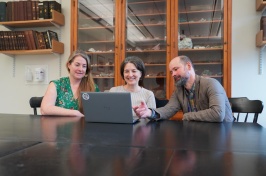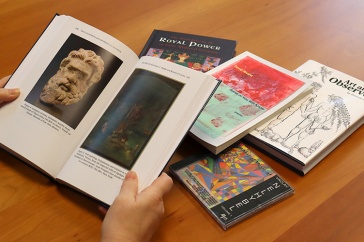
How do liberal arts graduates fare in the marketplace? What do employers think when they assess liberal arts graduates? We know our UNH liberal arts graduates have successful careers, but we want to offer you a look at the big picture. Recent studies on outcomes for liberal arts graduates nationwide show that the American workplace embraces and rewards these graduates for their skills and talents. Here’s a roundup—take a look.

Employer Perspectives
The Association of American Colleges and Universities (AACU) conducted a survey that measured expectations employers have for their college graduate hires. Several key findings from their report suggest that most employers value the skills that students develop in liberal arts disciplines:
- Employers cite the capacity to think critically, communicate clearly, and solve complex problems as more important than a student’s choice of undergraduate major, and they want higher education to place more emphasis on these skills. Ethical judgment and integrity, cultural skills, and a capacity for new learning are also cited as important skills by 9 out of 10 employers.
- The majority of employers agree that field-specific knowledge and a broad range of skills and knowledge is most important for recent college graduates to achieve long-term career success. Eighty percent agree that college students should acquire broad knowledge in the liberal arts and sciences and 74% would recommend a liberal education as the best way to prepare for success in today’s global economy.
- Employers endorse a blended mode of liberal and applied learning, including practices such as collaborative problem-solving, internships, research, senior projects, and community engagements.

The Chronicle of Higher Education conducted their own survey of employers to find out what employers think colleges should be doing to prepare students for the workplace. The report's recommendations seek to strengthen the tie between the liberal arts and career development and echo the idea from the AACU report that pursuing a particular major isn't as important as the skills students learn along the way:
- Colleges and universities should seek to break down the false dichotomy of liberal arts and career development—they are intrinsically linked.
- Colleges and universities should support rich experiential opportunities that truly integrate the liberal arts with real-world learning as communication skills and problem solving skills.
- Colleges should go beyond a vision of majors articulating to specific careers. Majors matter to some extent, but in many cases, college major is not the determinant of career entry. A college should approach career development as career exploration for a great many of its students, guiding and supporting students with the right mix of solid liberal arts skills and content knowledge.

The Economic Data
In a study by AACU and the National Center for Higher Education Management Systems, U.S. Census and other economic data were used to look at earning power and employment of liberal arts graduates over their careers. The findings demonstrate that liberal arts majors are on par with professional and preprofessional majors in terms of earnings over the course of their professional lives:
- At peak earnings ages (56-60 years) workers who majored as undergraduates in the humanities or social sciences earn annually on average about $2000 more than those who majored as undergraduates in professional or pre-professional fields.
- Humanities and social science majors are the drivers of U.S. intellectual capital. About 40 percent of individuals who hold a baccalaureate degree in a humanities or social sciences field also hold a graduate or professional degree—more than in any other field. These graduates experience, on average, a yearly boost in earnings of nearly $20,000.
A National Conversation
The work of the American Academy of Arts and Sciences is also revealing. In 2010, the Academy created a commission in response to a bipartisan request from Congress to advance a dialogue on the importance of the humanities and social sciences to the future of the U.S. The commission held workshops and meetings across the country to address arts and sciences education, research, and creativity. In their report released last year, two of the three goals the commission advances link a liberal arts education to a thriving economy:
- America should foster a society that is innovative, competitive, and strong. The ability to adapt and thrive in a changing world is based not only on instruction for specific jobs of today but also on the development of professional flexibility and longterm qualities of mind: inquisitiveness, perceptiveness, the ability to put a received idea to a new purpose, and the capacity to share and build ideas with others.
- America should equip the nation for leadership in an interconnected world. The humanities and social sciences teach us about ourselves and others. They enable us to participate in a global economy that requires understanding of diverse cultures and sensitivity to different perspectives. And they make it possible for people around the world to work together to address issues such as environmental sustainability and global health challenges.
The Big Picture
Together, these reports indicate that liberal arts majors are thriving in the workplace. Employers value the skills developed in liberal arts disciplines and care less about which particular major students pursue. When liberal arts students integrate research or an internship into their education, they are even more marketable. Employers look for good communicators and creative minds, ones who can solve problems and innovate—skills that develop through an education devoted equally to depth and breadth. Moreover, by the time their careers mature, liberal arts graduates can expect to earn as much or more than those in professional or pre-professional fields.
So how do liberal arts graduates fare in the marketplace? They not only hold their own in today's workforce, but they also are well prepared for the creativity and flexibility needed to advance their careers and lead America into the heart of the twenty-first century.

Reports Cited
- It Takes More Than a Major: Employer Priorities for College Learning and Student Success, an online survey among employers conducted on behalf of the Association of American Colleges and Universities, by Hart Research Associates, April 10, 2013.
- The Role of Higher Education in Career Development: Employer Perceptions, Chronicle of Higher Education, December, 2012
- How Liberal Arts and Sciences Majors Fare in Employment, by Debra Humphreys and Patrick Kelly. Association of American Colleges and Universities, January 22, 2014
- The Heart of the Matter, the Report, American Academy of Arts and Sciences, 2013
-
Written By:
Susan Dumais '88 '02G | College of Liberal Arts





















































